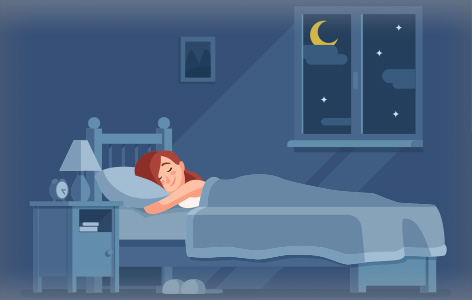
By: Dr. Laura Kuhlmann, ORT Times Science Writer
Sleep is one of the most important and time-consuming, yet least understood, aspects of our lives. While it may be tempting to dismiss sleep as ‘wasted time’, current scientific evidence has highlighted that sleep plays a crucial role in our wellness and longevity. Most adults need around eight hours of sleep per night. However, approximately two thirds of adults get less than eight hours. Consequently, The World Health Organization has declared a global epidemic of sleeplessness. Many people often voluntarily cut their slumber time short, because of stress and work obligations. Sleep deprivation can have devastating consequences on our bodies, including disrupted metabolisms, decreased immunity, impaired concentration and diminished creativity. Acknowledging the importance of sleep and learning how to practice healthy sleep hygiene is therefore paramount.
The physiology of sleep
Sleep and wakefulness are governed by the circadian rhythm, a complex process of physical and behavioural changes (e.g., feeling hungry and seeking food at meal times; decreasing body temperature, feeling sleepy and diminishing activity as bedtime approaches) that repeat approximately every 24 hours. While maintained in part by the brain’s hypothalamus, the circadian rhythm can be perturbed by environmental stimuli such as blue light, seasonal changes or jetlag.
During sleep, body temperature and heart rate decrease, and metabolic processes that help build complex molecules predominate.
The importance of sleep
Sleep has two varieties: REM (rapid eye movement) and non-REM. REM and non-REM sleep alternate four to six times a night, with the duration of REM sleep increasing towards the morning.
During non-REM sleep, the brain as well as the immune, skeletal, and muscular systems undergo physical regeneration accompanied by the removal of metabolic waste products. Dreaming occurs primarily during REM sleep, which has been shown to be vital for solidifying memory. Moreover, dreaming boosts creativity and aids the processing of emotions, including trauma.
Importantly, our brain needs both types of sleep. A sleep-deprived person will spend more time in non-REM sleep on the first night, only for the REM proportion to significantly increase in subsequent nights.
What disrupts sleep
There are many factors that can negatively impact a good night’s rest. Increased coffee or alcohol consumption close to bedtime often prevents our bodies from initiating and maintaining sleep. Similarly, exposure to blue light from laptop or phone screens can also prevent us from falling asleep, by impairing our circadian clock’s ability to self-regulate.
Stress is also a potent disruptor of sleep. Paradoxically, some sleep medications can alter healthy non-REM–REM cycles, leading to an increased sleep debt.
In conclusion, although some modern opinions portray sleep as lost time that needs to be cut short, sleep is indeed necessary for stabilizing mood and appetite, boosting memory and creativity and regulating the immune system and metabolism. By practicing good sleep hygiene, everyone can enjoy all these health benefits for free.




